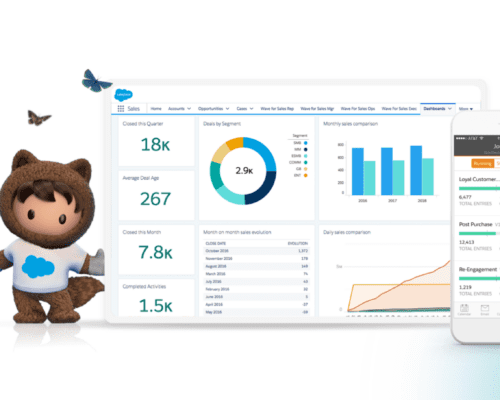The evolution of marketing in the AI era is not just a trend; it’s a fundamental shift in how brands engage with their audience. Salesforce is at the forefront of AI with its innovative platforms and industry-leading research. In Salesforce’s AI-Powered Opportunities for Marketers Workbook, they outline four ways AI can transform your marketing strategy and the unprecedented results it can produce. In this blog post, we dive into these four pillars and the different Salesforce AI tools you can use.
AI-Powered Segmentation: Crafting Hyper-Targeted Audiences
AI-powered segmentation transforms how marketers view and divide their target audience. You need to find a balance between overly broad customer segments and too specific ones. Either approach can leave you with an ineffective campaign that doesn’t hit targets.
Beyond traditional demographic segmentation, Salesforce’s approach uses AI to analyse intricate customer behaviour and preference patterns. This advanced segmentation enables marketers to identify nuanced customer groups, each with distinct needs and responses to marketing stimuli. The significance of this approach lies in its ability to drive highly personalised marketing tactics, moving away from the generic “one size fits all” methodology.
Salesforce’s tools, like Data Cloud’s Segment Creation, use AI to automate and refine this process, allowing marketers to create complex yet highly relevant segments effortlessly. Additionally, Einstein’s Lookalike features enable the identification of new prospects that mirror high-value segments, thus broadening the campaign’s reach without diluting its effectiveness.
AI-Powered Personalisation: Elevating Customer Experience
Personalisation has always been a key driver in marketing, and Salesforce’s AI-powered personalisation takes the customer experience to a new level. This pillar is about delivering personalised, hyper-relevant content and product recommendations to each customer. Leveraging vast amounts of data, AI algorithms can predict and respond to consumer preferences in real time, offering a level of personalisation previously unattainable.
80% of business leaders say generative AI will increase revenue. – Salesforce’s Untapped Data Research
However, implementing such sophisticated AI personalisation requires high-quality data and skilled professionals. Salesforce’s Einstein Content Selection and Recommendations tools help overcome these challenges by automatically tailoring content and offers to individual customer profiles, enhancing engagement and conversion rates.
AI-Powered Orchestration: Synchronising Marketing Communications
AI-powered orchestration is about delivering the right message at the right time through the right channel. This aspect of AI marketing focuses on optimising communication strategies, ensuring that messages are relevant and timely.
Salesforce MCE and MCAE analyse past engagement data to predict the optimal timing for sending messages. This predictive approach, combined with Einstein’s insights into engagement frequency and channel preferences, ensures that marketing communications are effective and welcomed by the audience. By orchestrating these elements, Salesforce’s AI tools help create a seamless and impactful communication flow, enhancing customer experiences and engagement rates.
62% of full-time desk workers say they don’t have the skills to effectively and safely use the technology. – Salesforce’s Untapped Data Research
However, to orchestrate AI-powered customer service seamlessly, your team needs to be trained in how to use the technology. Learning how to use AI tools, like Salesforce MCAE, can help your company utilise AI and get the best results from it.
AI-Powered Insights: Informing Data-Driven Strategies
The final pillar, AI-powered Insights, is about harnessing the power of data to inform and refine marketing strategies.
Extracting meaningful insights from vast datasets is crucial in the current data-rich environment. Salesforce’s AI-driven insights dive into customer behaviours, preferences, and interactions.
These insights are descriptive and predictive, offering foresight into future trends and customer actions. Tools like Einstein Marketing Insights provide detailed analyses of marketing performance, including monitoring KPIs with EMI bots to detail specific metrics. This helps marketers understand what works and what doesn’t. It is a continuous learning process that requires adaptation to stay ahead in the rapidly evolving marketing landscape.
Harnessing AI for Transformative Marketing
In conclusion, Salesforce’s AI-driven approach to marketing, encompassing Segmentation, Personalisation, Orchestration, and Insights, offers a comprehensive framework for marketers to enhance their strategies. By embracing these pillars, marketing teams can achieve a level of precision, personalisation, and efficiency previously unimaginable. The future of marketing is intricately tied to AI, and for those who wish to lead the charge, mastery of these tools is not just beneficial; it’s essential.
Learn more about Salesforce and automation in our report on How to Maximise your Sales Cloud Potential to Impact your Sales Performance.










